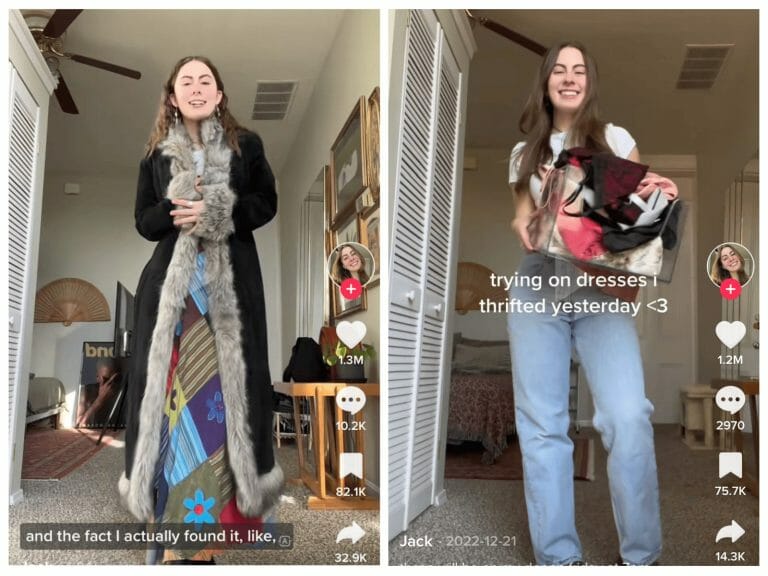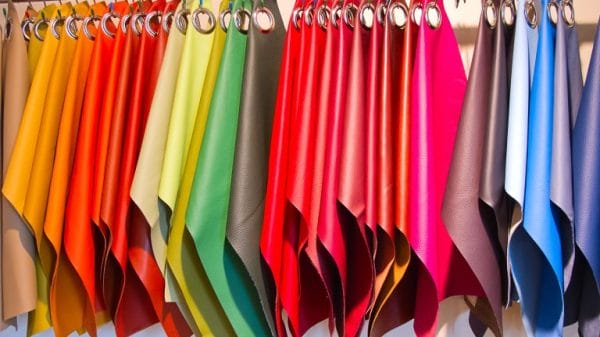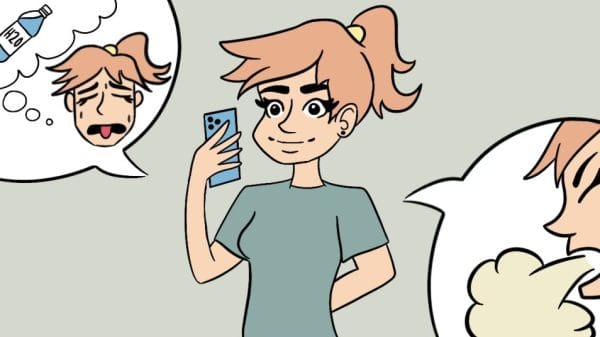TikToker, Jacklyn Wells (@jbwells2), has been shamed for reselling thrifted clothes on Depop for two or three times the price she bought them. One of the items that sparked so much uproar was a long coat she found and then resold for $175. Her account has caused an international debate over the ethics of reselling thrift clothes.
Known for her content on TikTok, where she posts thrift hauls, Jacklyn has 416.1K followers, with her most liked video of ‘trying on dresses I thrifted yesterday’ gaining 5.1 million views and 1.2 million likes. It honestly seems as though she is dedicated to promoting sustainable fashion and encouraging people to buy second-hand clothes instead of supporting cooperations involved in fast fashion.
People are angry, though. A user commented on her video saying, ‘Reselling thrifted clothes for double/triple the price is insane and messed up fr.’ It had 5322 likes.
I was a bit confused about the whole thing. Sure, selling a coat for $175 did seem a bit insane. Still, I didn’t understand how resellers were doing anything wrong. It seemed to me like they were trying to make a profit so they could pay their bills. It’s something people have been doing for years.
The Ethics of Resellers
The unethical argument is that resellers are effectively ‘stealing’ from the poor. Thrift stores and charity shops have been around for a while to offer second-hand clothing at a lower, more affordable price. By buying all the good stuff from thrift stores, you are robbing the opportunity for other people to have nicer clothes at a lower price.
TikTok user @buttercrying posted this video which received 1 million views and 188.8K likes:
She says: ‘Capitalising off of a service created for low-income individuals and families is fucking ugly. You’re all bad people. I don’t care.’
Her point is entirely valid. After all, thrift stores and charity shops were created not only to supply low-income individuals with affordable clothing, but a lot of the time, the money they make from the clothes will go back into helping those individuals. Goodwill is ‘a provider of employment, training, and rehabilitation for people of limited employability, and a source of temporary assistance for individuals whose resources were depleted.’ This means that the money made in their thrift stores goes back to low-income individuals.
Not all charity shops work this way; some put their money into research or medicine. But Jacklyn mostly shops at Goodwill, so while she is ‘capitalizing off of a service created for low-income individuals, ‘ she is also contributing to a charity that works with them.
It’s also worth noting that many people who resell are not incredibly rich. Most of the time, they are people, primarily women, who are just trying to make some extra cash.
Are Resellers Buying Out Thrift Stores?
The other argument against resellers is that they are forcing charity shops to increase their prices which will eventually result in them closing down. If they close down, it not only limits the options for low-income individuals but also means that many clothes will go straight to landfills. It would be a hit to sustainable fashion as there would be fewer alternatives for fast fashion.
One Twitter user pointed out that thrift stores have too many clothes and can’t sell them fast enough.
A volunteer at a thrift store shared a picture of the number of clothes that were going to developing countries or being recycled because they didn’t sell:
Resellers buying so many clothes from thrift stores is helping them. With so many more clothes, there’s enough to go around for everyone. Discouraging resellers from buying from thrift stores will result in the stores throwing out more clothes.
A Different Perspective
Another TikTok user gave an alternative view:
@prettycritical argues that many of the hate resellers receive out of jealousy. Thrifting has grown to appear cool and trendy, but as the TikTok user says, most of the time, it is ‘the luck of the draw.’ The hate is partly down to people envying that they didn’t find those clothes first.
Honestly, I understand why people feel like reselling is unethical. But ultimately, these people are still contributing to charities and promoting sustainable fashion. There will always be more clothes. Most importantly, users such as @jbwells2 are getting people into thrifting and shopping for second-hand clothing.













